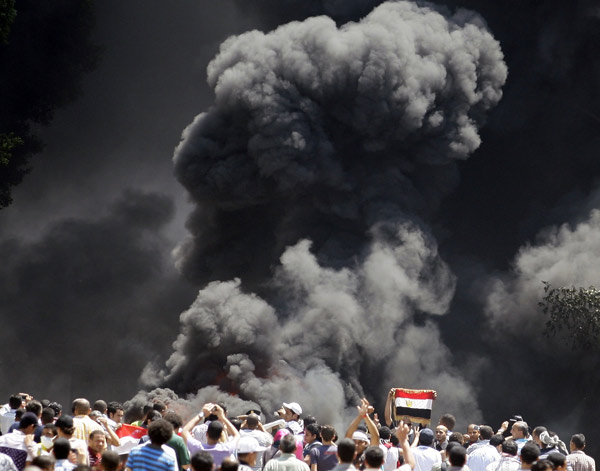Egypt police clash with youths; over 1,000 hurt
 0 Comment(s)
0 Comment(s) Print
Print E-mail
Xinhua, June 30, 2011
E-mail
Xinhua, June 30, 2011
The clashes between Egyptian security forces and young protestors in the Tahrir Square in central Cairo has injured 1,036 Egyptians till Wednesday, Heath Minster reported.
 |
|
Protesters are seen in front of smoke after burning a police booth in front of the Interior Ministry in Cairo June 29, 2011. [Photo/Agencies] |
Assistant Health Minister for Technical Affairs and Political Rights Abdel-Hamid Abaza said among the injured people at least were 50 policemen.
He added that well-equipped ambulances are spread in Tahrir Square and neighboring areas to treat the injured or transfer them to hospitals if necessary.
Hundreds of protesters threw stones and fire-bombs at riot police late Tuesday night while the clouds of tear gas were billowing in the square to disperse them.
The situation, the worst in the several weeks, was contained Wednesday morning and anti-riot police were deployed to secure the surroundings of Tahrir Square and the nearby interior ministry building.
Eyewitnesses said that the involvement of a group of people loyal to former president Hosni Mubarak was the main reason behind the riot. They disrupted a gathering in a theater near the square, where families of those killed in the mass protests that ousted Mubarak were honoring the victims.
Some protesters chanted slogans demanding Mohamed Hussein Tantawi, head of the Supreme Council of the Armed Forces (SCAF) now ruling Egypt, to step down.
The security forces arrested at least 40 people, all of whom will be referred to military prosecution.
Interior Minister Mansour Essawi said police forces are exercising wisdom and self-restraint in dealing with current events. Several political parties in addition to National Council for Human Rights condemned the incident which included violence acts against civilians.
According to the official MENA news agency, Egypt's Tagammu party attributed the reasons for the clashes to the government slowness in meeting public demands that will be tackled via setting up a new political system, based upon political and social stability.
In its statement, the party called for drafting a new constitution, electing new president, trying those involved in killing the demonstrators and compensating their families.
Meanwhile, the Wassat party described the clashes as a conspiracy aiming to destabilize the country. The party linked the incidents to a decision by Cairo court to dissolve the municipal councils in the whole country, which were controlled by the now dismantled National Democratic Party.
Ahmed el-Hawary, a 32-year-old French teacher, said: "what is happing in Tahrir square is a declaration for the death of betrayal and tyranny that prevailed the former president regime."
"People will no longer bear bad treatment or carelessness regarding their lawful rights," he added.
While physician Mohammed Elwan, 45, said that Tahrir's clashes revealed the status of revenge that dominated the civilians regarding the police officer.
The SCAF on Wednesday warned Egyptians to act against those committing the regrettable incidents, stressing that the incidents destabilized Egypt's security and stability.
The army also urged citizens to abort the scheme to protect the country's safety and security.
Some pro-democracy activists claimed remnants of the disbanded NDP plotted the riot after the Administrative Court ordered Tuesday to dissolve all 1,750 local councils across the nation.
The court ruled that these councils were the tools of the former regime to serve the former regime's interest, and they should no longer be in function after the former constitution was annulled by the army.
Egyptian people are also angry over the slow pace of trial of the former interior minister Habib el-Adli, who was held accountable for ordering the killing of unarmed protesters during the 18-day protests, in which at least 800 people were killed and more than 6,000 injured.





